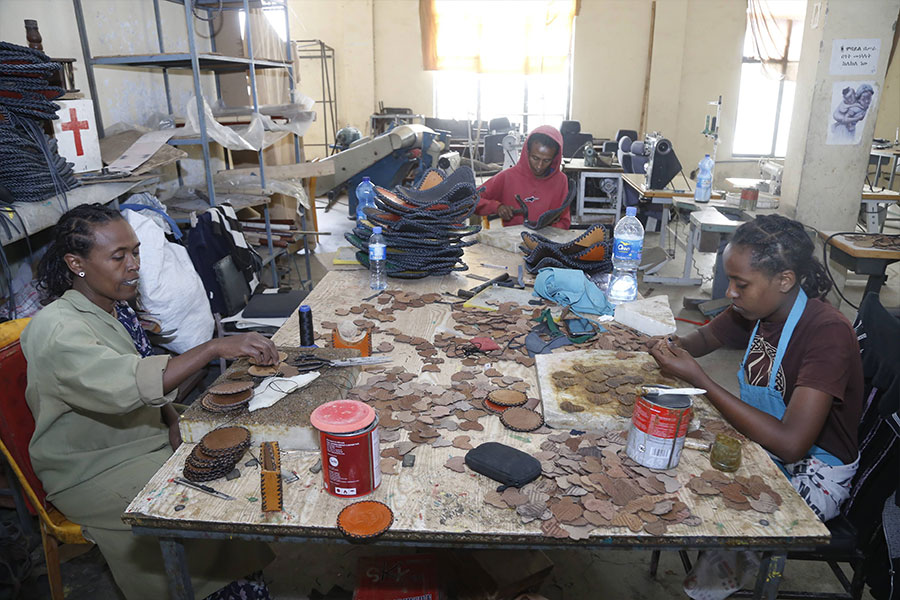
Viewpoints | Oct 22,2022
A policy measure that favoured steel importers over manufacturers was laid out as the major issue for the industry tethering on the brink of collapse. Following discussions at the Prime Minister's Office with Girma Birru, advisor to the macroeconomic committee, leaders from the Association of Ethiopian Basic Metals & Engineering Industries took swift action, enlisting the expertise of Ruhe Long & Flat Products Consultancy Plc to probe into the industry's woes.
Under the stewardship of Belete Sirabizu (PhD), the study analysed the four-year performance of 19 steel manufacturers, uncovering a litany of issues plaguing the sector. From excessive stockpiles to glaring policy deficiencies and foreign currency shortages, the findings told a tale of underachievement lingering at less than 20pc capacity.
At the heart of the industry's woes were importers enjoying clear advantages, courtesy of duty-free privileges and opaque incentive mechanisms. Manufacturers tackled a shortage of inputs to remain competitive in the market, accessing only a fraction of their 1.5 million tons monthly demand.
According to Belete, the acute shortage of scrap metal clogged production capacities and led to inflated market prices. He highlights the glimmer of hope, suggesting that manufacturers retained the potential to ramp up annual output to 5.3 million tons under conducive conditions, doubling the demand. However, existing policies heavily favoured importers, exacerbating the influx of duty-free steel imports.
Over 1.25 million tons of steel valued at 600 million dollars were imported predominantly from China last year. This marked a significant increase compared to the previous year, which saw imports at 201,000tns, and an even greater leap from two years prior with 263,000tns from Turkey.
“Control mechanisms should've been in place,” Belete told Fortune.
Belete suggests redirecting efforts from imports through franco-valuta measures towards using the scheme for importing raw materials. This shift aims to boost domestic production while curbing the reliance on imported finished goods. The abundant potential of unexplored iron ore reserves in the northern region, according to Belete, signals an opportunity for economic growth.
While the source of illicit imports remains elusive, over 56 million Br worth of contraband steel was confiscated by the Ethiopian Customs Commission in the past six months. Tegegene Derese, head of Inspection at the Commission, acknowledged the rigorous inspection procedures but emphasised the need for a comprehensive investigation to uncover the true extent of illicit activities.
The findings were submitted to the macro-economic committee three weeks ago. Representing 76 members, Solomon Mulugeta, the Association's general manager, said the study has exposed policy gaps that pose imminent threats to the industry that endured longstanding neglect.
"We need urgent remedial action," he said.
The plight dates back to when the Ministry of Industry was responsible for steel manufacturers until a few years ago. The role was transferred to the Ministry of Mines. Responsible for overseeing 34 steel manufacturers, the Ministry's attempts to address input shortages by granting manufacturers direct access to scrap metal from public institutions yielded limited success; the scrap metal found in public institutions was less than 3000tns while the manufacturer's monthly demand stands at 1.5 million tons.
Companies like Sentinel Steel Plc struggled to remain operational with a fifth of their yearly 120,000tns capacity. Demisse Shibiru, the Company's director, expressed the difficulty of remaining competitive, citing significant price discrepancies of up to 30 Br between imported steel, largely driven by soaring production costs.
He remains optimistic about the potential for reform to breathe new life into the industry. He believes that forthcoming policy changes will provide a much-needed boost, urging policymakers to prioritise the revitalisation of the steel sector.
"Our industry deserves the proper attention," he said.
Price disparities between domestically manufactured and imported rebars were observed, with the latter enjoying up to a 30pc price advantage. Birtukan Yenealem, head of the metallic mineral desk, cited loose coordination among customs authorities and control mechanisms as contributing factors exacerbating the situation.
According to Birtukan, efforts were stepped up to explore new iron ore reserves in the Amhara and Oromia regional states, with hopes of reducing import reliance. She said attempting to attract investors to develop the country's iron ore resources could boost long-term health that hinges on the completion of feasibility studies.
"Exploration needs a large amount of investment," she said.
The study serves as a clarion call for decisive action on the steel industry, underscoring the coherent policy frameworks and strategic interventions. The industry's woes were compounded by foreign currency constraints and the proliferation of contraband steel, undermining domestic producers' competitiveness. Short-term measures such as incentives for quality material imports and scrap market regulation are recommended, alongside long-term strategies like bolstering domestic steel mining capabilities.
Ambitious plans to explore iron ore reservations seem far-fetched for Abebe Dinku (Prof), a veteran civil engineer, who cautioned against the slim plans for any investor to be interested in joining in. He advises against knee-jerk reactions like outright import bans, advocating instead for a balanced approach.
He says, "Liberalised markets tempered with prudent oversight."
PUBLISHED ON
Mar 23,2024 [ VOL
24 , NO
1247]

Viewpoints | Oct 22,2022

Radar | Oct 12,2024

Commentaries | Mar 07,2020

Agenda | Apr 09,2022

Editorial | Jun 14,2025

Fortune News | Aug 17,2025

Fortune News | Jan 07,2024

Fortune News | Dec 02,2023

View From Arada | Mar 23,2019

Advertorials | Feb 12,2024

Dec 22 , 2024 . By TIZITA SHEWAFERAW
Charged with transforming colossal state-owned enterprises into modern and competitiv...

Aug 18 , 2024 . By AKSAH ITALO
Although predictable Yonas Zerihun's job in the ride-hailing service is not immune to...

Jul 28 , 2024 . By TIZITA SHEWAFERAW
Unhabitual, perhaps too many, Samuel Gebreyohannes, 38, used to occasionally enjoy a couple of beers at breakfast. However, he recently swit...

Jul 13 , 2024 . By AKSAH ITALO
Investors who rely on tractors, trucks, and field vehicles for commuting, transporting commodities, and f...

Nov 1 , 2025
The National Bank of Ethiopia (NBE) issued a statement two weeks ago that appeared to...

Oct 25 , 2025
The regulatory machinery is on overdrive. In only two years, no fewer than 35 new pro...

Oct 18 , 2025
The political establishment, notably the ruling party and its top brass, has become p...

Oct 11 , 2025
Ladislas Farago, a roving Associated Press (AP) correspondent, arrived in Ethiopia in...